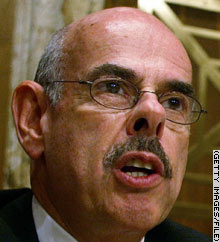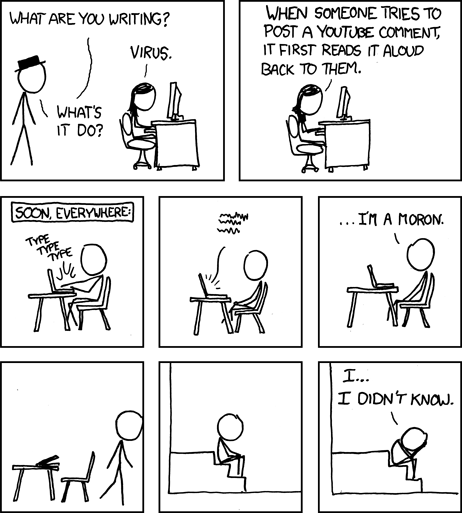Predictions for 2012
14 years ago
The Interdome - You may be a blogger but you ain't no dancer

 D: "In each case, corporate excess and greed enriched company executives at enormous cost to shareholders and our economy." - blaming a isolated class of villians, attributing destructive actions to moral turpitude
D: "In each case, corporate excess and greed enriched company executives at enormous cost to shareholders and our economy." - blaming a isolated class of villians, attributing destructive actions to moral turpitude R: "In this political season, the search for villains is understandable and in some respects, healthy. While we’re at it, we might ask ourselves why this Committee didn’t convene these hearings last March, when market turbulence first turned toxic. There’s plenty of blame to go around as we try to unravel the wildly complex tangle of people, private companies, government agencies, and market forces that is choking modern capitalism. We’ve all played a part in this crisis, and we’ve all learned invaluable lessons." - can't you see, we're the reason this happened! You and me, Waxman! Aren't we, Americans, the one's who are really to blame?
R: "In this political season, the search for villains is understandable and in some respects, healthy. While we’re at it, we might ask ourselves why this Committee didn’t convene these hearings last March, when market turbulence first turned toxic. There’s plenty of blame to go around as we try to unravel the wildly complex tangle of people, private companies, government agencies, and market forces that is choking modern capitalism. We’ve all played a part in this crisis, and we’ve all learned invaluable lessons." - can't you see, we're the reason this happened! You and me, Waxman! Aren't we, Americans, the one's who are really to blame? But, let us not forget... well, um, Claude Levi-Strauss. Structures of kinship, etc. I won't delve into it here. Did you know that in five weeks Levi-Strauss will be one-hundred years old? Amazing!
But, let us not forget... well, um, Claude Levi-Strauss. Structures of kinship, etc. I won't delve into it here. Did you know that in five weeks Levi-Strauss will be one-hundred years old? Amazing! I think the problem, as with most problems regarding value, occurs under commodification. Prostitution is the epitome of the commodification of sex. The sex is reduced to a menu of acts, and the price is firmly set in exchangeable counters. Now, this is not the problem itself; the problem is that when these securitized acts are commodified, it is much easier for oppression to occur. Perhaps the giver of the act has to agree to a price that s/he did not set; perhaps the act includes violence or power relations that would not ordinarily be securitized with the act under desired circumstances; or perhaps there is a capitalist involved who takes profit merely for packaging and marketing these securities. My metaphor here is not in topical jest; I think this is the problem. The problem with commodities from Marx's perspective: surplus value. What are you paying that you are not compensated for? In general prostitution, sometimes it is as simply as your parent's morality. Sometimes it is as dire as your bodily integrity and personal safety.
I think the problem, as with most problems regarding value, occurs under commodification. Prostitution is the epitome of the commodification of sex. The sex is reduced to a menu of acts, and the price is firmly set in exchangeable counters. Now, this is not the problem itself; the problem is that when these securitized acts are commodified, it is much easier for oppression to occur. Perhaps the giver of the act has to agree to a price that s/he did not set; perhaps the act includes violence or power relations that would not ordinarily be securitized with the act under desired circumstances; or perhaps there is a capitalist involved who takes profit merely for packaging and marketing these securities. My metaphor here is not in topical jest; I think this is the problem. The problem with commodities from Marx's perspective: surplus value. What are you paying that you are not compensated for? In general prostitution, sometimes it is as simply as your parent's morality. Sometimes it is as dire as your bodily integrity and personal safety. But, to return to the subject at hand, I think that the point of contention for sex and art is not that certain exchanges occur; the point is that commodity of desire into packaged securities can give and take surplus value where it is not due. It can be capitalized. Warhol, for instance, was able to create the impression of value in his mass-produced art, where I think it was not warranted. There was a certain sexiness built in to his work via his persona, which was not only not due, in my opinion, but perhaps was accumulated at the expense of those working in the Factory (the metaphor here, is simply not a metaphor). Did the unseen, anonymous "production assistants" receive any compensation for the notoriety Warhol achieved with Blow Job?
But, to return to the subject at hand, I think that the point of contention for sex and art is not that certain exchanges occur; the point is that commodity of desire into packaged securities can give and take surplus value where it is not due. It can be capitalized. Warhol, for instance, was able to create the impression of value in his mass-produced art, where I think it was not warranted. There was a certain sexiness built in to his work via his persona, which was not only not due, in my opinion, but perhaps was accumulated at the expense of those working in the Factory (the metaphor here, is simply not a metaphor). Did the unseen, anonymous "production assistants" receive any compensation for the notoriety Warhol achieved with Blow Job?
 So I discovered, via Slashdot (of course) that the most recent Nobel Prize winner for work in economics, Paul Krugman, was inspired to study economics by the Isaac Asimov series, Foundation.
So I discovered, via Slashdot (of course) that the most recent Nobel Prize winner for work in economics, Paul Krugman, was inspired to study economics by the Isaac Asimov series, Foundation. Anyway, the idea that, in one's youth, one might read a fictional story containing a speculative idea regarding the way that human life works, and then, extract and abstract that idea as part of one's own personal life goals for the general betterment of humanity, is something that is not only very believable, but very humble at the same time. Rather than conceiving a pie-in-the-sky legend as causal dogma, this takes what is right in front of oneself, and infuses it with one's own creativity. This is nothing less than the most idealistic hopes of literature: to inspire readers to do great things and think great thoughts, using only the simple tool of words and ideas linked together.
Anyway, the idea that, in one's youth, one might read a fictional story containing a speculative idea regarding the way that human life works, and then, extract and abstract that idea as part of one's own personal life goals for the general betterment of humanity, is something that is not only very believable, but very humble at the same time. Rather than conceiving a pie-in-the-sky legend as causal dogma, this takes what is right in front of oneself, and infuses it with one's own creativity. This is nothing less than the most idealistic hopes of literature: to inspire readers to do great things and think great thoughts, using only the simple tool of words and ideas linked together. I'm reading Nietzsche's Zarathustra right now. It's not a perfect piece, but it is very lovely in many respects. As a critic of a certain source of modernism, he often gets labeled as one of the fathers of post-modernism, or at the very least, lumped in among other such characters. (The actual father of the term as it is now used, in my opinion, is Lyotard, but, like so many things, this is another story for another post). I tend to think of Nietzsche as the first humanist; though certainly others may also fit the term. Let's call it the ideal humanist then, if for no other reason than that the liberal democratic persuasions of current humanists would most likely make Frederich puke.
I'm reading Nietzsche's Zarathustra right now. It's not a perfect piece, but it is very lovely in many respects. As a critic of a certain source of modernism, he often gets labeled as one of the fathers of post-modernism, or at the very least, lumped in among other such characters. (The actual father of the term as it is now used, in my opinion, is Lyotard, but, like so many things, this is another story for another post). I tend to think of Nietzsche as the first humanist; though certainly others may also fit the term. Let's call it the ideal humanist then, if for no other reason than that the liberal democratic persuasions of current humanists would most likely make Frederich puke. Today I want to post this aphorism because despite its place within Nietzsche's humanistic project, it is still a lovely piece of work on Value, a fallacious concept that was very easily adopted by the individualism that Nietzsche helped bring into the world. Value is important, especially semiotic values; but this does not extend to such strict and powerful compartmentalization such as commodities. The notion of the awesome power of the individual aside, we could still learn a thing or two about such "poison flies". Especially in such a market as this one--a subject of some of my recent posts.
Today I want to post this aphorism because despite its place within Nietzsche's humanistic project, it is still a lovely piece of work on Value, a fallacious concept that was very easily adopted by the individualism that Nietzsche helped bring into the world. Value is important, especially semiotic values; but this does not extend to such strict and powerful compartmentalization such as commodities. The notion of the awesome power of the individual aside, we could still learn a thing or two about such "poison flies". Especially in such a market as this one--a subject of some of my recent posts. Now re-check: bankers (supported by government) screw over people trying to buy houses -> markets quake in fear while legislation consolidating the nation's capitalistic power sail through Congress. Our current door prize is the Office of Financial Stability, attached to the Treasury. You have to love that name. It doesn't quite say, "propping up our failing economic system" in the same way that "The Strong-Arm of Capitialism League" would, or the way a dilapidated FEMA trailer does. but OFS is good enough. It also lends itself to the great anti-globalization/capitalism slogan, "Fuck OFS!" My copyright certificate is in the mail.
Now re-check: bankers (supported by government) screw over people trying to buy houses -> markets quake in fear while legislation consolidating the nation's capitalistic power sail through Congress. Our current door prize is the Office of Financial Stability, attached to the Treasury. You have to love that name. It doesn't quite say, "propping up our failing economic system" in the same way that "The Strong-Arm of Capitialism League" would, or the way a dilapidated FEMA trailer does. but OFS is good enough. It also lends itself to the great anti-globalization/capitalism slogan, "Fuck OFS!" My copyright certificate is in the mail. From the New York Times: "Fears about the economy also motivated support. 'Nobody in East Tennessee hates the fact more than me that I am going to vote yes today after voting no on Monday,' Representative Zach Wamp, a Republican, said. 'Monday I cast a blue-collar vote for the American people,' he continued. 'Today I am going to cast a red, white and blue-collar vote with my hand over my heart for this country, because things are really bad and we don’t have any choice.'" Well, Representative Wamp, you've made it pretty clear. Instead of voting in the name of your constituents, you decided to vote with your Jingoistic shirt on. Good on you.
From the New York Times: "Fears about the economy also motivated support. 'Nobody in East Tennessee hates the fact more than me that I am going to vote yes today after voting no on Monday,' Representative Zach Wamp, a Republican, said. 'Monday I cast a blue-collar vote for the American people,' he continued. 'Today I am going to cast a red, white and blue-collar vote with my hand over my heart for this country, because things are really bad and we don’t have any choice.'" Well, Representative Wamp, you've made it pretty clear. Instead of voting in the name of your constituents, you decided to vote with your Jingoistic shirt on. Good on you. Among the artifacts that were not bought in studio lot/prop warehouse actions, are some actual things of historical value. Almost every exhibit that features a particular book or author contains a good-condition, first edition copy of the work in question. See the photo to the right, which I snapped before I was informed there were no photographs allowed (sorry, there was no sign, and I was taking pictures of artifacts, not works, with no flash). Behold! The entire 17,000 page manuscript of Neal Stephenson's The Baroque Cycle! I have to be honest; I got a bit choked up while standing there in front of it. Not out of any sort of fanboy awe. (I also have to admit that the trilogy is still on my exponentially expanding "to read" list.) I felt a sense of overwhelming admiration for the amount of work that had to go into such an expansive, creative project, and the sheer magnitude of what 17,000 written pages looks like. I can't judge the literary content standing on the other side of the glass, but still, the amount of effort that went into creating these pages is obvious. I know how I feel about my own petty manuscript notebooks, and how I would feel if anyone of them ever escaped my grasp. So, to think that Neal Stephenson lent this massive, handwritten accomplishment out of his grasp is the essence of creativity indeed. Oh, and if you were curious, the little larvae looking things splayed out like armament for a stealth bomber are all the ink cartridges that he used writing the pages.
Among the artifacts that were not bought in studio lot/prop warehouse actions, are some actual things of historical value. Almost every exhibit that features a particular book or author contains a good-condition, first edition copy of the work in question. See the photo to the right, which I snapped before I was informed there were no photographs allowed (sorry, there was no sign, and I was taking pictures of artifacts, not works, with no flash). Behold! The entire 17,000 page manuscript of Neal Stephenson's The Baroque Cycle! I have to be honest; I got a bit choked up while standing there in front of it. Not out of any sort of fanboy awe. (I also have to admit that the trilogy is still on my exponentially expanding "to read" list.) I felt a sense of overwhelming admiration for the amount of work that had to go into such an expansive, creative project, and the sheer magnitude of what 17,000 written pages looks like. I can't judge the literary content standing on the other side of the glass, but still, the amount of effort that went into creating these pages is obvious. I know how I feel about my own petty manuscript notebooks, and how I would feel if anyone of them ever escaped my grasp. So, to think that Neal Stephenson lent this massive, handwritten accomplishment out of his grasp is the essence of creativity indeed. Oh, and if you were curious, the little larvae looking things splayed out like armament for a stealth bomber are all the ink cartridges that he used writing the pages. This work is licensed under a Creative Commons Attribution-Noncommercial-Share Alike 3.0 License.
(except for what is re-published from elsewhere, obviously.)
This work is licensed under a Creative Commons Attribution-Noncommercial-Share Alike 3.0 License.
(except for what is re-published from elsewhere, obviously.)